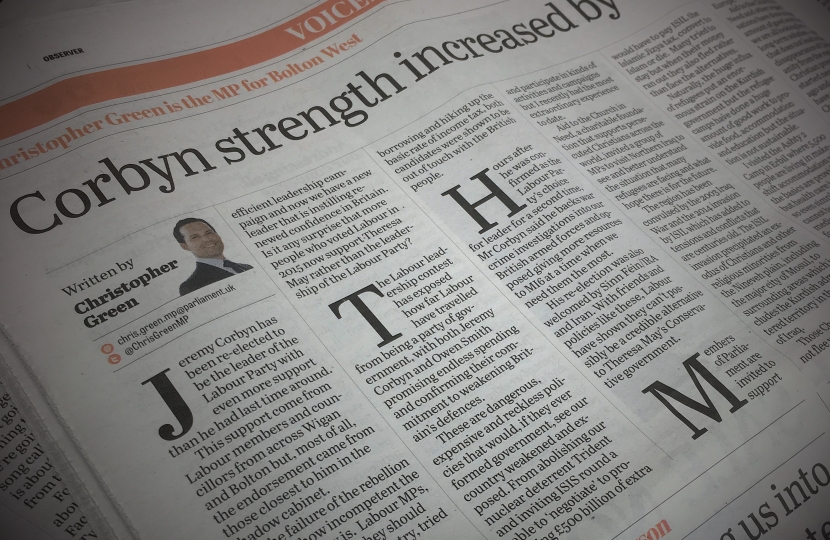
Jeremy Corbyn has been re-elected to be the leader of the Labour Party with even more support than he had last time around. This support come from Labour members and councillors from across Wigan and Bolton but, most of all, the endorsement came from those closest to him in the shadow cabinet.
The failure of the rebellion showed how incompetent the Labour Party is. Labour MPs, who think that they should be running the country, tried to overthrow Mr Corbyn but they just increased his strength. The contrast with the Conservative Party could not be greater. We had quick efficient leadership campaign and now we have a new leader that is instilling renewed confidence in Britain. Is it any surprise that more people who voted Labour in 2015 now support Theresa May rather than the leadership of the Labour Party?
The Labour leadership contest has exposed how far Labour have travelled from being a party of government, with both Jeremy Corbyn and Owen Smith promising endless spending and confirming their commitment to weakening Britain’s defences. These are dangerous, expensive and reckless policies that would, if they ever formed government, see our country weakened and exposed. From abolishing our nuclear deterrent Trident and inviting ISIS round a table to ‘negotiate’ to proposing £500 billion of extra borrowing and hiking up the basic rate of income tax, both candidates were shown to be out of touch with the British people.
Hours after he was confirmed as the Labour Party’s choice for leader for a second time, Mr Corbyn said he backs war crime investigations into our British armed forces and opposed giving more resources to MI6 at a time when we need them the most. His re-election was also welcomed by Sinn Féin/IRA and Iran. With friends and policies like these, Labour have shown they can’t possibly be a credible alternative to Theresa May’s Conservative government.
Members of Parliament are invited to support and participate in kinds of activities and campaigns but I recently had the most extraordinary experience to date.
Aid to the Church in Need, a charitable foundation that supports persecuted Christians across the world, invited a group of MPs to visit Northern Iraq to see and better understand the situation that many refugees are facing and what hope there is for the future.
The region has been convulsed by the 2003 Iraq War and the 2014 invasion by ISIL which has added to tensions and conflicts that are centuries old. The ISIL invasion precipitated an exodus of Christians and other religious minorities from the Nineveh plain, including the major city of Mosul, to surrounding areas which includes the Kurdish administered territory in the north of Iraq.
Those Christians that did not flee where told that they would have to pay ISIL the Islamic Jizya tax, convert to Islam or die. Many tried to stay but when their money ran out they also fled rather than face the alternatives.
Naturally, the huge influx of refugees put an enormous strain on the Kurdish government but the refugee camps have done a huge amount of good work to provide food, accommodation and education but the situation is not sustainable.
I visited the Ashty 2 Camp in Erbil where 5,500 people are living in makeshift accommodation where the basics are provided for but health care is minimal so even simple operations cannot be carried out and medication cannot be afforded. As there is insufficient educations and little work available, parents know that they and their children have little future unless they go back to their towns and villages or depart to Western Europe.
Aid to the Church in Need and other organisations have done a huge amount of good work but we are all looking for a long term solution – one that does not lead to the disappearance of Christianity from the region. The Christian presence in Mosul started nearly 1900 years ago and many other areas have a similarly ancient Christian tradition.
The Islamic State captured Mosul with just 300 fighters who drove off the Iraqi Army numbering in the 10s of thousands but it now looks like the city and neighbouring villages will soon be recaptured. Refugees now want to go home to rebuild their lives so, when we think about foreign aid and the DIFD budget, this has to be to top priority. We have the chance to give people back their futures and bring peace to this part of the Middle East.

